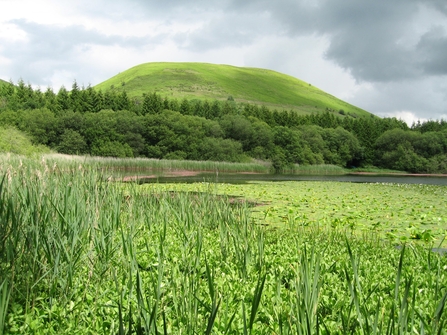Natural Flood Management – Wilder Lugg Project
What exactly is Natural Flood Management (NFM)?
Natural flood management involves harnessing the power of natural systems to reduce flood and drought issues – this may mean restoring natural processes such as flood plain connection and re-connecting old river channels, or it may require mimicking natural processes through the creation of new structures such as building ponds, scrapes and leaky dams. NFM aims to slow the flow of water out of the catchment, holding back water and releasing it at a slower rate – reducing the impacts of both flooding (high flows) and drought (low flows).
Why is it necessary? Should we not simply dredge the rivers to reduce flooding?
Previously, river management focused on hard engineering to protect areas from flooding, as well as straightening river channels, reducing woody debris and draining areas of water retention. While there are circumstances that may require hard-engineering solutions, generally this approach has only led to further flood, erosion and water quality issues. Dredging rivers has an incredibly adverse impact on wildlife, often taking many years to recover, while in reality, it only pushes the flood issues further downstream.
Why now?
Climate and biodiversity collapse has exacerbated the effects of flooding and droughts, even in seemingly wet countries like Wales. We are seeing higher peaks of rainfall and longer periods of drought, both contributing to huge impacts on both the landscape and the economy. Land use change has impacted the catchment’s ability to retain water as well as contributing to its declining quality in many cases – in the past 100 years England and Wales has lost up to 90% of its wetland and floodplain habitat. This is a staggering loss and a clear indication of what is required – we must work with farmers and landowners to reinstate wetland habitats where possible.
The challenges
As a society we have become accustomed to hard-engineering and technological solutions to our problems – sometimes convincing the public that nature can provide beneficial solutions, can be the biggest hurdle. In some cases, our rivers have been heavily altered, straightened, or forced into a declining ecological condition that requires large scale interventions. It is not uncommon for some of farmers most productive land to sit alongside rivers and as such, a change of management in this area can present a real challenge for farm businesses. However, there are many solutions that work for both our rivers and our rural communities…
The Opportunities
Now more than ever, we know where we have gone wrong, and we know how to fix it. But we at RWT cannot do this alone – we need to work with landowners and farmers across Radnorshire to makes the necessary changes to our landscape and its management. When compared with hard-engineering solutions, NFM is comparatively cheap, can be extremely quick to implement and changes can be observed almost immediately. Most of the river Lugg catchment comprises of clay substrates, making many sites suitable for wetland creation, and Radnorshire’s many valley basins harbour land suitable for floodplain restoration.
What are some of the options that may work in Radnorshire?
The beautiful landscapes of Radnorshire provide a diversity of habitats and topographies, meaning there are a range of options when considering NFM. Some examples of wetland habitat may include Rhos pasture, Willow or Alder carr, footslope wetlands, Oxbow lakes, ponds, marshland, reedbeds and floodplain hay meadow.
There is often a belief that wetlands cannot work within a farming system but in fact, perhaps the opposite is true. Planned, designed, and managed appropriately, wetland creation on the farm can increase drought resilience, biodiversity and carbon sequestration, all while reducing the impact of peak water flows downstream – you will be doing your neighbour a favour!
A map showing the potential opportunities for wetland habitat throughout Powys can be found here: https://www.bis.org.uk/wetland-opportunities
As well as wetlands, there are many landscape management methods that can help with NFM such as woodland creation, increased riparian vegetation and diversity, cross contour farming, reduced poaching along riverbanks, rotational grazing, cover-cropping and buffer strips along riverbanks.
Wilder Lugg – what are the key issues in the Lugg catchment?
As many will know, the river Lugg has big issues with flooding. Rivers need to flood as part of their natural processes; however, we use our landscapes intensively and it is important they flood where they do not damage our productive farmland and infrastructure. As well as flooding issues, the Lugg is a designated SSSI in declining condition, as well as the river Wye which it feeds, both suffering from increased nutrient levels related to landscape management, intensive livestock units and sewerage discharges, leading to a reduced water quality. On top of this, climate change is heightening the effects of all the above and reducing the rivers’ ability to restore itself.
The Wilder Lugg project is not concerned with ‘who is to blame’, but on working with those willing to implement solutions and creating the necessary change. The only way we can implement the level of change necessary to turn things around in our rivers is by working together – the Wilder Lugg project aims to empower the local rural community to bring about a long-term vision for the health and maintenance of the river Lugg. River users and concerned parties may have different ideas regarding how the river should be managed but almost everyone agrees they want to see a clean, healthy river, full of life and functioning as it should – and that is the ground in which we will stand on together, to guarantee the sustainability of the river Lugg for generations to come.
Dan Westbury - Wilder Lugg Project Officer
Want to get involved in our up-coming Citizen Science Project on the river Lugg? Or would you like to discuss land management on your land located in the Lugg catchment? Get in touch at - dan@rwtwales.org


